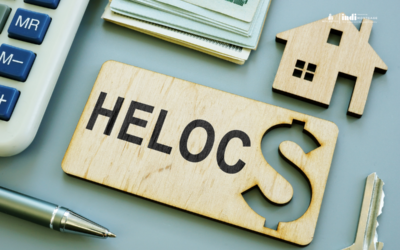Welcome To Our Mortgage Educational Blog About:
Pros And Cons Of A Home Equity Line Of Credit (HELOC)

If you’re a homeowner looking for financial flexibility, you may have considered tapping into your home equity.
One popular option for accessing home equity is a Home Equity Line of Credit (HELOC).
A home equity line of credit (HELOC) is a type of credit product that allows homeowners to use the equity in their homes as collateral for the loan.
Unlike a home equity loan, a HELOC is a revolving line of credit, similar to a credit card, which means that you can borrow money as you need it, up to a certain limit.
While HELOCs can offer attractive interest rates and flexibility, they may not be the best fit for everyone.
Here, we’ll weigh the pros and cons, as well as explore the alternatives to a home equity line of credit and help you decide which option is best for you.
Advantages Of A HELOC
Here are some of the pros of a home equity line of credit –
1. Easy Access To Available Credit
With a HELOC, you have access to a credit line that you can use as needed.
Once you are approved for a HELOC, you can access the funds whenever you need them, up to your available credit limit.
This can be especially helpful if you have an unexpected expense or a large purchase to make.
2. Lower Interest Rates Than Other Types Of Credit
HELOCs often come with lower interest rates than other types of credit, especially unsecured loans and credit cards.
This is because the loan is secured by your home, which makes it less risky for the lender.
Lower interest rates mean that you will pay less interest charges over the life of the loan, which can save you a significant amount of money.
3. Interest Is Only Paid On The Amount Borrowed
Another advantage of a HELOC is that you have to only pay interest on the amount you have borrowed.
This means that if you are approved for a HELOC with a credit limit of $50,000, but only borrow $10,000, you will only pay interest on the $10,000.
This can help to keep your monthly payments lower, especially if you are using HELOC to finance a larger project over a longer period of time.
4. No Prepayment Penalty
Unlike some other types of loans, HELOCs do not typically come with a prepayment penalty.
This means that you can repay the money you borrow at any time without incurring additional fees.
This can be helpful if you have extra cash on hand and want to pay off your HELOC early to save on interest charges.
5. Flexible Borrowing Options
HELOCs are flexible and can be set up to fit your borrowing needs.
For example, you can choose to use your HELOC for a specific purpose, such as home renovations, or you can use it as a general line of credit for any purpose.
You can also choose to borrow a large amount upfront or borrow smaller amounts over time as you need them.
6. Debt Consolidation
Another advantage of a HELOC is that you can use it to consolidate your debts, often at a lower interest rate.
This can be helpful if you have multiple high-interest debts, such as credit cards or personal loans, that you want to pay off.
If you have multiple debts with high-interest rates, you can use a HELOC to consolidate them into one lower monthly payment.
This can make it easier to manage your debt and save you money on interest payments.
Disadvantages Of A HELOC
While a HELOC can be a useful financial tool for accessing your home’s equity, there are also several potential disadvantages to consider before taking one out.
1. The Discipline Required To Pay Off The Monthly Interest
Unlike a home equity loan, where you make regular payments towards the loan balance, with a HELOC you are usually only required to pay monthly interest.
This means that if you only make the minimum payments, your loan balance will not decrease, and you may end up carrying the debt for a long time.
2. Lower Interest Rates Than Other Types Of Credit
Because a HELOC allows you to borrow against the equity in your home, it can be tempting to use the money for non-essential expenses, such as vacations or home renovations.
However, it’s important to remember that the money borrowed must be paid back, and failing to make timely payments can result in serious consequences.
3. Restrictions When Switching Mortgage Lenders
If you want to switch your mortgage to another lender, you may have to pay off your full HELOC and any credit products you have with it.
This can be costly and time-consuming and can limit your options if you are looking to refinance or sell your home.
4. Risk Of Losing Your Home If Payments Are Missed
Because a HELOC is secured by your home, failure to make timely payments could result in foreclosure, where your lender can take possession of your home and it can also damage your credit score.
It’s important to carefully consider all of these potential risks before taking out a HELOC and to ensure that you have a solid plan in place for repaying the loan in a timely and responsible manner.
Additional Cons Of A HELOC That Are Similar To Other Credit Products
Every credit product has some disadvantages. Following are some cons of a HELOC that are similar to other loan options –
1. Variable Interest Rates
The interest rates on HELOCs are usually variable, which means they can fluctuate over time.
This can make it difficult to predict how much you’ll owe in interest each month and can make it hard to budget and plan for future payments.
2. Credit Limit Reduction
The lender may reduce your credit limit if there is a decline in the value of your home or if your credit score drops.
This can limit your ability to borrow against your home equity.
3. Full Payment Demand
Your lender has the right to demand that you pay the full amount of the loan at any time.
This can be difficult to manage if you’re not prepared to repay the loan.
4. Credit Score Impact
Borrowing against your home equity can have a negative impact on your credit score, particularly if you borrow more than you can afford to repay or miss payments.
How Are HELOCs Different From Other Types Of Home Loans?

HELOC allows you to use your home as collateral to borrow funds from a lender.
The amount you can borrow with a HELOC is based on how much equity you’ve built up in your home, or how much your home is worth minus any outstanding home loans you owe.
HELOC vs Home Equity Loan vs Credit Cards
HELOCs are typically offered by credit unions and banks, and they have variable interest rates, which means the rate can fluctuate over time.
- Unlike home equity loans, which provide a lump sum of money at a fixed interest rate, a HELOC is more like a credit card in that you can use and repay funds from your line of credit as needed, up to a certain limit.
- If you’re considering a HELOC, you’ll need to apply for one and undergo a home appraisal to determine the amount of the line of credit you’re eligible for.
- HELOCs can be combined with a first mortgage, and you can still get a HELOC even if you already have a fixed-rate loan on your home.
- However, it’s important to understand that the interest rates on your HELOC may be higher than on other types of home loans and credit options.
You should also consider whether a home equity loan, HELOC, or mortgage refinancing is the right choice for you based on your individual financial situation and goals.
Is Home Equity Line Of Credit Right For You?
A Home Equity Line of Credit (HELOC) can be a useful financial tool for accessing your home’s equity.
It offers lower interest rates than other types of credit, easy access to available credit, and flexible borrowing options.
However, it also requires discipline to pay off monthly interest, and there is a risk of spending beyond your means.
Before taking out a HELOC, it’s important to consider all of the advantages and disadvantages and determine if it’s the right fit for your financial needs.
If you’re unsure, there are alternative options such as credit cards, home equity loans, or personal loans that may be better suited for you.
To learn more about your options, contact us and speak to a professional who can guide you in the right direction.
Don’t hesitate to contact us with any questions you may have.
Recent Educational Blogs
Smart Steps for First‑Time Home Buyers in Canada
Feb 2026 | Smart Steps for First‑Time Home BuyersBuying your first home is one of life’s most exciting milestones—but it can also feel like stepping into uncharted territory. Between saving, budgeting, and securing financing, there’s a lot to think about before you...
First Responder Mortgage Program
Jan 2026 | First Responder Mortgage ProgramAt Metro Mortgage Group, we have deep respect for the everyday heroes of our city — the members of the Edmonton Police Service, EMS, and Fire Rescue Services. Your commitment keeps our community safe, often at great personal...
Pros and Cons of a Home Equity Line of Credit (HELOC)
Dec 2025 | Pros and Cons of a Home Equity Line of Credit (HELOC)If you’re a Canadian homeowner, you’ve probably heard friends or family talk about using a home equity line of credit, or HELOC. People often use it to renovate, consolidate debt, or help kids with school...



